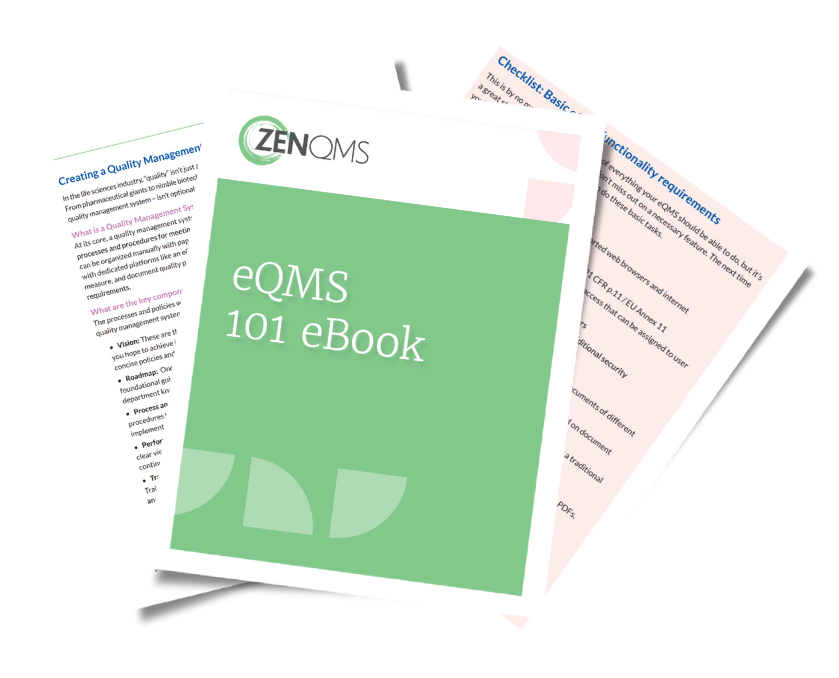Key takeaways:
- An eQMS is a software platform for comprehensive quality management
- Critical for regulatory compliance in life sciences
- Offers significant improvements over manual and spreadsheet-based systems
- Enables real-time collaboration and efficient audit preparation
In the world of quality management, if it wasn’t documented, it didn’t happen… and that’s a problem for the quality teams who pour countless hours into keeping their companies compliant. When the FDA inspector arrives, the only thing that matters is proof. Unfortunately, massive spreadsheets, or worse, stacks of paper files, make finding that proof difficult. That’s where an electronic quality management system (eQMS) comes in.
Brush up on quality management fundamentals with the eQMS 101 eBook.
Learn how to choose an eQMS, how much an eQMS should cost, and how to get leadership buy-in for the quality management software you need.

The eQMS basics: What is an eQMS?
An eQMS, or electronic quality management system, is like the digital headquarters for all of your quality management activities. An eQMS is a software platform that allows things like your standard operating procedures, work instructions, training documents, quality records, and more to all live together in one secure, easy-to-navigate digital space.
Key modules of an eQMS
An eQMS usually contains a variety of modules designed to handle specific quality management tasks. These modules often include things like:
- Document Control: Manages document versions, approvals, and distribution.
- Training Management: Assigns and tracks employee training and ensures compliance with regulatory requirements.
- Issues and Change Controls: Allows reporting and tracking of CAPAs, deviations, issues notifications, and process changes.
- Audit Management: Facilitates planning, execution, and follow-up of audits and vendor qualifications.
- Supplier/Vendor Management: Manages supplier contracts and relationships.
Manual quality management vs. spreadsheets vs. eQMS
What's the difference between manual quality management, "digital" quality management, and an eQMS? Often, manual quality management relies at least in part on physical paper. Picture stacks of folders, filing cabinets, 3-ring binders, and driving from building to building to collect ink signatures. This process is the most labor-intensive, prone to human error, challenging to audit, and at risk for data loss and non-compliance.
Spreadsheet-based QMS processes, like those that use Excel, can be considered a “digital” option, but still quite limited. Though it’s a step in the digital transformation direction, as the company grows and quality management gets more complex, spreadsheets become impossibly tough to manage. Plus, they lack the automation that’s helpful for audit trails, version control, and real-time collaboration, which means efficiency and compliance still take a hit. Though this type of quality management happens with digital tools, we'd still give it the "manual QMS" label.
On the opposite end of the scale, an eQMS is specifically designed for quality management. It integrates with other digital tools, is scalable, and is built with regulatory compliance in mind.
Why an eQMS matters for life sciences companies
Quality management in life sciences is a big deal—for obvious reasons. These GMP, GCP, and other GxP-regulated companies deal with products and processes that impact human health, from medicines to medical devices. There's no room for error when it comes to safety. Quality management is the foundation of consumer safety, and it keeps companies moving forward without fear of regulatory disruptions or a lapse in consumer trust.
The problem is that many quality teams are asked to carry out their tasks without the right tools to do so. Unfortunately, manual quality management (think pen and paper, or lengthy spreadsheets) often leads to more errors, missing documents, and wasted time.
But when QA is at its best, business is better. With a tool like an eQMS, quality teams can stay efficient and spend fewer company resources staying compliant and completing successful audits. Plus, the faster they can ensure quality, the faster the business can hit the market. Simply put, companies that prioritize quality gain a competitive edge in an industry where trust is key.
Uncover hidden fees, predict long-term expenses, and find the true cost of an eQMS.
Download the eQMS cost comparison calculator to learn exactly how much to budget for the right quality management software.
How an eQMS impacts quality teams
Imagine you need to update a company-wide SOP. If you’re working under a manual quality management system, this means tracking down the authorized approver to give them the paper copy, waiting for their signature (and sending several reminders), and then collecting the piece of paper back again. Repeat for every signature needed. Then, you need to retire the old version, removing all outdated copies from circulation and replacing them with the new SOP.
After manually logging the updates and approvals in your paper file or spreadsheet, you have to share the updated SOP with all relevant employees, and then manually assign and track their training sessions, updating each employees’ training dossier in the process.
That’s a lot of time, effort, and room for error ... all for just one SOP!
If you’re a quality professional, you don’t have to imagine this scenario. You live it every day.
When the weight of the company’s compliance lies on your shoulders, you deserve better tools to do your job. That’s where QMS software comes in. Here’s how an eQMS makes a difference:
- More efficient, more compliant, more good days: An eQMS automates a lot of quality management functions like requesting signatures, version-controlling documents, tracking training, and risk management. That's less time spent chasing down colleagues or logging changes in dozens of different places, and more time doing the parts of your job you actually enjoy — all while meeting the highest standards of compliance.
- QA data is power: Quality teams aren’t “cost centers.” They’re critical revenue and resource protectors – and a good QMS software gives them the tools to prove it. With an eQMS, quality teams can easily track and analyze trend data on compliance, training, deviations, preventative actions and more, providing leadership with invaluable insight to fuel continuous improvement and growth.
- Audit readiness: Not only does quality management software make it easy to track your quality documents and processes, it allows you to find exactly what you need at an audit’s notice. Instead of scrambling to meet an auditor’s request, the right document is available at the right time, making sure you get credit for your commitment to quality.
- Real-time collaboration: In today's world, your team might be spread across different cities, countries, or even continents. An eQMS allows for real-time collaboration, making sure everyone is on the same page, no matter where they are.
For quality management professionals in the life sciences space, an eQMS isn't just another tool. It's an essential ally that these teams deserve, both to make their lives easier and consumers safer.
FAQs about eQMS
What does eQMS stand for?
eQMS stands for electronic Quality Management System.
Who needs an eQMS?
All GxP-regulated companies can benefit from an eQMS. This is especially true for organizations within the life sciences industry, including:
- Biopharma organizations
- GMP-regulated manufacturers
- Life sciences contractors such as CROs and CMOs/CDMOs
- Medical device companies
- Biotechnology organizations
- Healthcare technology providers
How do I choose the right eQMS?
Though every organization's quality needs are different, regulatory compliance features, scalability, flexibility, and ease-of-use are key factors to prioritize during your eQMS search.
To get in-depth tips on how to choose the right eQMS, how much to budget for the system you need, and how to get your C-suite on board, download the eQMS 101 eBook resource for Quality Management leaders.
